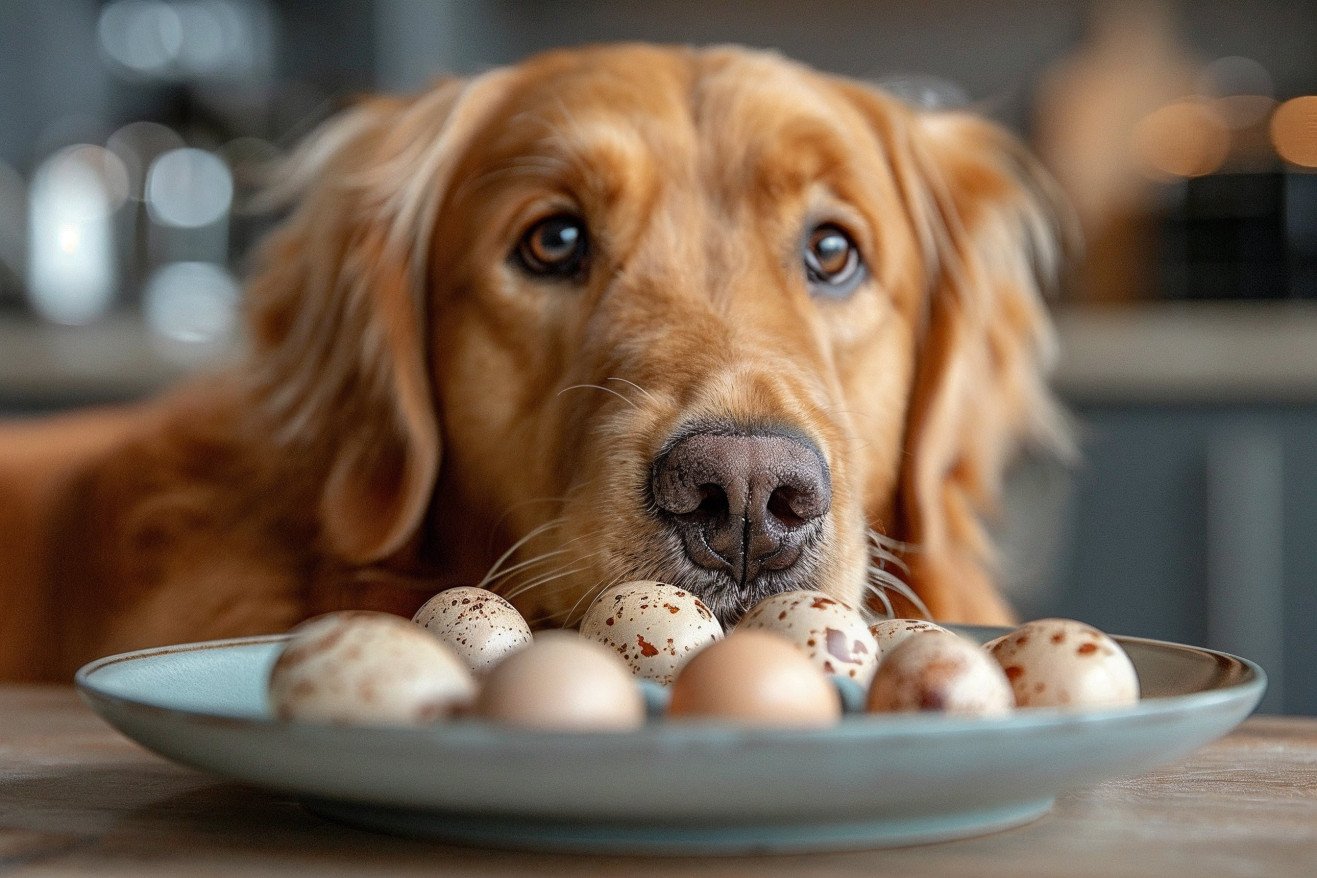Can Dogs Eat Quail Eggs? An In-Depth Review
4 May 2024 • Updated 2 May 2024

If you’ve ever eaten quail eggs, you know how tasty they are, but are they safe for your dog to eat, or could they be harmful? Quail eggs are safe for dogs and can be a healthy addition to their diet in moderation. They are packed with protein, vitamins, and minerals, and have many of the same nutritional benefits as chicken eggs. However, because they are high in fat and cholesterol, it’s best to limit the number of quail eggs you give your dog.
Although quail eggs have many of the same nutritional benefits as chicken eggs, there are some important differences that we’ll take a closer look at. This article will review the latest findings from veterinarians and animal nutritionists to help you better understand the potential health benefits and risks, the best ways to prepare quail eggs for dogs, and how many quail eggs you should feed your dog. By the end, you’ll have the information you need to decide whether or not to give your dog this special treat.
Can dogs eat quail eggs?
Quail Eggs for Dogs: Nutritional Benefits
Quail eggs are rich in essential amino acids, vitamins, minerals and micronutrients that can help improve a dog's well-being. Quail eggs have higher levels of phosphorus, iron, B vitamins like B1, B2, and other important nutrients than chicken eggs. The nutrients in quail eggs can help promote growth, support brain health, reduce allergies and diseases, and improve skin and coat health.
Both the eggs and the shells are rich in calcium and phosphorus, which can help support bone and dental health. Quail eggs are also a great source of fatty acids, selenium, iron, vitamin B12 and vitamin A, which can help make your dog's coat look shinier and healthier while also helping to prevent certain skin conditions. The lutein content can help support eye health and reduce the risk of eye conditions like cataracts. Due to their rich nutrient content, quail eggs can be a great way to provide your dog with a nutrient-rich supplement that can help support a number of different areas of their health and well-being.
How Many Quail Eggs Should You Give Your Dog?
The number of quail eggs that you should give your dog will vary based on the size and age of your dog. Per O'Brien Feirme, small and medium puppies can eat 1 egg per day, while large puppies can eat 1-2 eggs per day. Meanwhile, small and medium adult dogs can eat 1-2 eggs per day, and large adult dogs can eat 2-3 eggs per day.
Big Country Raw and Poe both offer similar recommendations for the number of quail eggs to give dogs based on their size and age. However, it's important to not go over these amounts, as doing so can result in digestive problems such as stomach upset, gas, and bloating.
Potential Allergies and Sensitivities to Quail Eggs
Although quail eggs can be a great source of nutrition for dogs, it’s important to consider the potential for allergies and sensitivities. As noted by Quail Eggs and Allergies — Pet Foods Shop, dogs that are allergic to chicken eggs may also be allergic to quail eggs because of the similar proteins.
The symptoms of an egg allergy in dogs include vomiting, diarrhea, itchy skin, ear infections, and weight loss, according to the Egg Allergy in Dogs: Symptoms, Diagnosis and Treatments | Honest Paws article. While some research has shown that quail eggs can help reduce allergy symptoms, it’s important to be cautious when giving them to dogs that have a known egg allergy.
It’s also important to note the difference between a true egg allergy, which is an immune response and can be life-threatening, and a non-life-threatening egg intolerance. As mentioned in Are Eggs Good for Dogs?, dogs that are allergic to poultry meat can also be allergic to their eggs. Dogs should be watched closely when they’re given quail eggs, especially if they have a history of egg allergies.
How to Add Quail Eggs to Your Dog's Diet
As with any new food, you should add quail eggs to your dog's diet gradually and monitor for any signs of an allergic reaction or intolerance. Per Can Dogs Eat Quail Eggs? What You Need To Know, you can start by giving your dog a small portion, such as a quarter or half of an egg, and then slowly increase the amount over time.
Quail eggs can be given to dogs raw or cooked, but there is a greater risk of salmonella with raw eggs, especially for dogs that are immunocompromised. Per Can Dogs Eat Eggs? Get The Facts - Dogs Naturally, pasteurized or cooked quail eggs are the safer choice, especially when you first start giving them to your dog.
Risks and Precautions of Feeding Quail Eggs
Although quail eggs can be a healthy part of a dog's diet, there are some risks and precautions to keep in mind. According to Can Dogs Eat Eggs? Get The Facts - Dogs Naturally, while most dogs can eat several eggs per week with no problem, overeating can cause digestive upset, including vomiting and diarrhea.
In addition, Are Eggs Good for Dogs? explains that dogs with compromised immune systems or certain medical conditions are more susceptible to salmonella poisoning from raw eggs. The article also warns that overeating eggshells can lead to calcium imbalances, so their use as a mineral supplement should be closely monitored.
Like any new food, Everything you need to know about Dogs & Eggs: Can - Dog Child reminds dog owners to introduce quail eggs slowly and monitor their pets for any signs of allergies or intolerances. By keeping these risks in mind and taking the necessary precautions, you can ensure that this healthy snack is a safe addition to your dog's diet.
Conclusion: Adding Quail Eggs to Your Dog's Diet
When given in moderation and with the right precautions, quail eggs can be a healthy and nutritious addition to your dog's diet. They are a rich source of protein, vitamins, and minerals that can help in many areas of your dog's health.
As mentioned by O'Brien Feirme, quail eggs contain higher levels of vitamins and minerals than chicken eggs, including protein, iron, healthy fats and fatty acids, vitamin A, vitamin B2, vitamin E, zinc, selenium, folate, potassium, and phosphorus. These vitamins and minerals can help with muscle growth, prevent anemia, help the immune system, aid in digestion, and help with a shiny coat and healthy skin.
That said, it's important to stick to the recommended serving sizes based on your dog's size and age, as overconsumption can lead to tummy troubles. As mentioned by Spoiled Hounds, small to medium dogs can have 1-2 quail eggs a day, while large dogs can have 2-3 eggs a day. It's also important to introduce them slowly and watch for any negative side effects, as some dogs can be allergic or sensitive to quail eggs.
Because of their nutritional content, quail eggs can be a great addition to a balanced and diverse diet for dogs. By adding them in moderation and with caution, pet parents can help their dogs reap the many benefits of this superfood.


